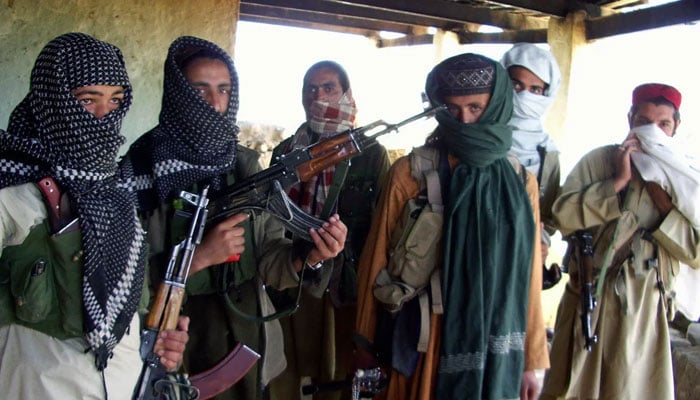They explained the role and scope of various mafias and their connections with each other  Armed members of the banned Tehreek-e-Taliban Pakistan (TTP) pose for a picture in this undated image. — AFP/File
Armed members of the banned Tehreek-e-Taliban Pakistan (TTP) pose for a picture in this undated image. — AFP/File
PESHAWAR: Security officials Thursday disclosed that oil smuggling from Iran into Pakistan had been brought down from 16 million litres to 5-6 million per day after they laid their hands on smugglers. In an interaction with the media, civil society members and teachers and students of medical and educational institutions here, the officials said a litre of oil cost the smugglers Rs15, which they sold at Rs280 in the country, earning Rs500 million a day.
“After the military laid hands on these elements, they launched a propaganda campaign against the security forces in and outside the country. But we don’t care about their false propaganda and will continue our efforts to defend our country,” said a security official.
They informed the participants about various aspects of the ongoing rise in violence and terrorism in the country, and the growing number of terrorist attacks on the law-enforcement agencies. They explained the role and scope of various mafias and their connections with each other. They serve each other’s interests by resorting to every kind of false propaganda against the state of Pakistan and its institutions. “Pakistan is a soft state for these mafias running illegal businesses worth billions of rupees. The mafias can go to any extent if their interests are threatened,” one of the senior security officials explained.
The participants were told that 23 terror outfits were currently operating in Afghanistan out of which 17 were only fighting against Pakistan and its national and economic interests. He said no other country in the world had fought terrorism so bravely like Pakistan’s security forces, including the military, paramilitary forces and police, which had been fighting for the last 22 years.
“We lost 90,000 lives in this war and faced economic losses worth $120 billion, but we are still standing there on the ground and fighting terrorists,” the security official added. He said on the one hand, there were Khwarij and, on the other hand, the Indians were engaged in their nefarious activities against Pakistan and its national interests.
The officials, however, repeatedly tried to remind the participants that the military alone would not be able to handle all of the challenges that the country had been facing. “There are many institutions having billions of rupees of budget and the people should question them as well.”
They recalled that after the devastating terrorist attack on the Army Public School (APS) in Peshawar on December 16, 2014, the political leadership and government sat together and devised the National Action Plan (NAP) and drafted a 21-point proposal to address terrorism in the country. “In 2021, the then government reduced the NAP points to 14 only. Nobody has worked even on the remaining 14 points,” said a security official.
He said out of 32,000 madaris in Pakistan, only 16,000 were registered with the Nacta, which was an essential requirement of the National Action Plan. “Nobody knows what type of syllabus they are teaching, who is running them and who is funding them,” said the security official.
Regarding the rising number of terrorist incidents in the country, the security officials stated that 1,063 terrorist acts had taken place since January 2024, leading to the death of 111 law enforcers.
“We are not sitting idle. In the past six months, 22,714 military-based operations have been conducted, almost 126 operations a day and five in one hour, in which more than 300 terrorists have been eliminated,” he explained.
According to the security officials, Khyber Pakhtunkhwa suffered badly due to terrorism and is still passing through a difficult phase due to terrorist activities there, saying nothing could be seen on the ground to prevent terrorism. “The Khyber Pakhtunkhwa government, from 2019 to 2024, received billions of rupees from the federal government as well as other provinces to better equip its police force and Counter-Terrorism Department to fight terrorism. The CTD has only 537 operational strength even though KP has been paid Rs410 billion since 2010 for security measures,” a security official informed the participants.
Besides these funds, they said the provinces had paid KP Rs110 billion for socio-economic development of the newly merged districts (NMDs), but nobody knew where that amount was spent. According to them, smuggling of various goods was a major problem and challenge for the country and its institutions.










